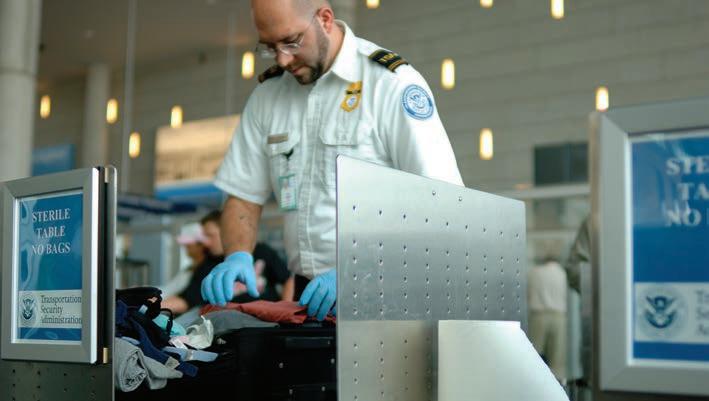
5 minute read
INSIDE TRAVEL
Getting South Africans safely back in the air
Will the battered aviation industry be able to rebuild and regain its place in the world economy after a devastating 2020?
Advertisement
Rebuilding confidence and showing travellers that it is safe to fly, is critical if the battered aviation industry is to regain its place in the world economy after a devastating 2020.
But there is already an abundance of green shoots forming after Covid-19 brought the industry to its knees mid-2020, Aviation Coordination Services (ACS) chief executive officer Duke Phahla believes. The vision of a trusted vaccine in 2021 fills him with hope that the darkest days in the industry now belong to the past.
“We need to have hope, and provide confidence to win back the masses,” he said. “Already, unique opportunities are forming with new players such as Lift entering the market. Novel technologies in areas such as the self-service kiosk are also emerging from the ashes, keeping our system up-time in check, ensuring travellers that they will travel with ease in the future. Some airlines have emerged stronger after the slump, such as FlySafair, who actually grew their market share.”
“The pandemic affected the entire globe. But I’m pleased to see that the recovery is beating the forecasted numbers that organisations such as the Bureau of Economic Research predicted.”
In the darkest of days, Mr Phahla said he realised that the virus had hit the reset button in his industry and that things would not be the same again; the same had happened to the industry post 9/11 with 100 per cent HBS (hold baggage screening) which became a regulation.
A vaccine will give travellers the necessary confidence to travel without concerns, Mr Phahla believes.
Coal face of travel
ACS is at the coal face of travel in South African airports as baggage screeners, while also managing the Baggage Reconciliation System, commonly use terminal equipment and self-service kiosks. The company, through its systems, enables the platform, ensuring that passengers’ bags board the flight with them, or that the bags are evicted from the plane if a passenger is not on board.
Mr Phahla remembers that at the beginning of the year - before the Coronavirus crisis hit - around 46,000 passengers per day passed through OR Tambo International Airport in Johannesburg.
In June, after President Cyril Ramaphosa imposed a strict lockdown a few months earlier, essentially shutting down South Africa’s passenger air travel, there were only 51,260 passengers per month of which most were repatriation from flights.
“Fast forward to November and we are on the road to recovery with 601,000 passengers, both international and domestic, passing through,” he explained.
Cost preservation mode
But global aviation was hard-hit by different lockdowns imposed by governments worldwide. Airports Council International (ACI) World’s outlook expected the global airport industry to generate $172bn (R2,5trn). Instead, the Covid-19 crisis impact on airport revenues will result in a reduction of a devastating $111.8bn (R1,7tn).
Mr Phahla said ACS had to go into cost preservation mode from April because of the reduced traffic, even though ACS is a non-dividend distribution company. Profits are ploughed back into the industry by investing in modern and state-of-the-art technology.
For instance, salaries had to be cut by 20 per cent. Mr Phahla explained that ACS’s business model is volume driven, with only R12 per ticket contributing to the baggage screening service. The more passengers there are, the more money will flow to ACS.
“It definitely affected us financially. We still had service providers to compensate for services provided. Our highly trained screeners needed to be paid. Equipment needed to be maintained. There were still repatriation flights that we had to provide services to.”
Contactless check-ins
ACS was jointly established in 1999 by the Airlines Association of Southern Africa (AASA), the Board of Airline Representatives of South Africa (Barsa) with the support of Airports Company of South Africa (Acsa), specifically to screen baggage for security purposes in South Africa. The company’s mandate is to specifically screen for suspected explosive material destined for carriage in hold baggage.
But they also manage self-service kiosks at the 13 South African airports in which they operate. While the machines are owned by the Airport Company of South Africa (Acsa), ACS operates and maintains them.
Already a common feature in most of the developed world’s airports, South Africans have been slower on the uptake. Mr Phahla believed the need for contactless check-ins would encourage South Africans to move to these kiosks en-masse.
ACS has agents at hand for travellers struggling with the kiosks, Mr Phahla said. The new kiosks will have the latest technology including touchless contact to further combat the Covid-19 virus.

Baggage screening
Just because airports carried less traffic, it did not mean that ACS could ease up on their critical baggage screening. Mr Phahla said that through the years ACS has discovered that someone is always trying to test the system.
The 15-year-old baggage screening machines belong to ACS, and with low volumes of traffic at the moment it may be an ideal opportunity to start upgrading the machines with the latest technology. Mr Phahla said investing in latest technology and state-of-the-art machines will ensure that South Africans feel more secure when flying.
Although searching for explosives is ACS’s primary objective, the screening machines have also become the nemesis of rhino horn smugglers, with screeners picking up more and more wildlife smuggling. Screeners also easily spot ornaments filled with drugs, Mr Phahla explained.
Baggage goes through five levels of screening, with most bags passing through in level one. If suspicious luggage is spotted at the machine, it is rejected to level two for further investigation, eventually leading to the passenger being paged and asked to open their suitcase at level four in the presence of authorities and airline representatives.
“Screening is a big responsibility, and we simply don’t hire people off the street. It is a specialist function which would require screeners to go through an intense training programme, enabling them to identify suspicious items contained in bags and they would have to attend regular refresher courses.”

ACS chief executive officer Duke Phahla.
What is the ACS?
ACS was jointly established in 1999 by the Airlines Association of Southern Africa (AASA), the Board of Airline Representatives of South Africa (BARSA) and the Airports Company of South Africa (ACSA) to provide operational support services to international and domestic airlines operating from, into and within South Africa.










